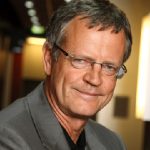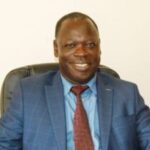Milton Mutto believes that populist leaders are emerging
because citizens are beginning to put the tough questions
to those in power. “People are asking, ‘Why are we here?
Why are we reaping little despite investing much?’”
Mareike Le Pelley thinks frustration with socio-economic
factors is driving the craving for populist leaders. “At the
core is poverty. Simple answers to complex questions are
what populist agenda offers.”
Boniface Pascal used the example of US president Trump
and his Russian counterpart Vladmir Putin to argue that
populism is a blurry concept. He said that while the two
leaders hold populist ideals at varying levels, “Putin has a
long-term vision of the world and his country [while] Trump
doesn’t.”
But how has the situation been in Africa? Do
populist leaders or other types abound on the
continent? The panellists took a historical dive into
the types of leadership on the continent.
Sarah Kasande Kihika noted that “politics in Africa has
always had a masculine face” and since colonial times, male
leaders have been projected as powerful. Kihika said that
male leaders created a cult following using the rhetoric of
anti-imperialism and preserving African culture yet all they
were doing was preserving their status.
“We are seeing a wave – young people are rejecting
revolutionary narratives and male deities.”
She decried the lack of representation of young people in
politics.
However, Mutto strongly disagreed with the idea that
young people should be a separate bloc of the population.
“We should reject polarising the population. So, the young
people are against who? I don’t think fracturing the
population helps but knowing what the problems are.”
Mutto said that Uganda, and Africa at large, is experiencing
a generational transition in leadership and that it is time
up for leaders who came to power at independence. “The
people at the helm of power are afraid of what the future
looks like and yet their ideas no longer work.” He said that
what makes African leaders strong are their godparents
from other parts of the world.
What about China’s leadership disposition of
communism; is it something to be emulated?
Mareike said that while there seems to be success with
regard to China’s leadership dispensation, it is at the
expense of the environment and human rights. Kihika
expanded on Mareike’s point on human rights, stressing
that across the world, the regression in human rights is an
outcome of populist leaders.
To wrap up the discussion, the panellists presented the
way forward for leadership on the continent.
Education and putting power at the centre, according to
Mareike, is what will rescue the leadership situation on a
continent that, she says, is dealing with alpha male leaders.
“Why are people not gathering around issues? You don’t
have to wait for people to give you transport allowance.”
Kihika said the contribution of young people in leadership
should not be underrated. She said that African strongmen
have learnt to use democratic ideals to serve their interests,
such as holding frequent elections. “We shouldn’t discredit
the involvement of youth in decision-making. It’s important.”
However, Mutto said that there is need to come up with a
well-thought-out agenda for change. He again rejected the
idea of disaggregating the population as youth or women.
“Dismembering the population doesn’t work. The leaders of
the system have cut a small cake and given it to the youth.
But we want the whole cake.”
Kampala Geopolitics Conference





